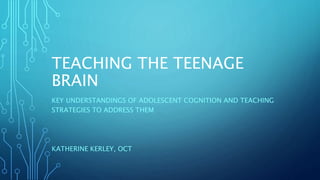
Teaching the Teenage Brain
- 1. TEACHING THE TEENAGE BRAIN KEY UNDERSTANDINGS OF ADOLESCENT COGNITION AND TEACHING STRATEGIES TO ADDRESS THEM KATHERINE KERLEY, OCT
- 3. WHAT DO WE KNOW ABOUT TEENAGE BRAINS? • ”Neural networks” are being finalized – connections formed in childhood that aren’t being used are ”pruned” away and lost • Chemical changes affect adolescents’ sleep cycle • Parts of the brain relating to emotional regulation are still developing – adolescents have strong emotional responses, lack impulse control, and have a hard time making accurate judgements
- 4. THE TEENAGE BRAIN (CONT’D) • Chronic stress in teens can lead to mood disorders in adulthood (anxiety, depression, etc.) • Teen brains are sensitive to hormones regarding pleasure, and thus seek out risks and emotionally-charged situations • Teens need to feel their biological and emotional needs are met in order to be able to learn effectively
- 5. TEACHING STRATEGIES TO ADDRESS ADOLESCENT MINDS
- 6. STRATEGY 1: FREQUENT REVIEW What teachers might do: • Provide students with opportunities to review their skills and knowledge regularly How? • Interactive quizzes, perhaps via tools like Kahoot • Exploring prior knowledge before attempting new learning • Have students do a “Jigsaw” – become experts and then teach each other How does this address adolescent cognition? • If students don’t revisit prior learning and frequently review what they know, the connections formed by initial learning will be quickly lost due to pruning.
- 7. STRATEGY 2: MAKE TOPICS RELEVANT What teachers might do: • Engage students emotionally by contextualizing course content in information and experiences that are relevant to students’ lives How? • Class debates (with rules regarding respectful disagreement) – allow students to get “fired up” about topics relevant to the world around them, but in a safe way. • Have students bring in news items or viral content that is relevant to course material and present it to their classmates. How does this address the adolescent cognition? • Teens seek out emotionally charged situations, as well as responding emotionally to events more often than adults. Providing teens with opportunities for emotional engagement speaks to how their brains are working in the moment. On the other side, the lack of ability to make accurate judgements requires a set of class rules around debate in order for students to respect one another.
- 8. STRATEGY 3: LOWER THE STRESS What might teachers do? • Create a classroom environment that is calm • Allow for multiple learning modalities How? • Strategically include music at times in your lessons • Acknowledge students’ emotional states and teach to where they are at each day (be flexible in your sequence and lesson-planning) • Create multiple opportunities for students to demonstrate understanding (not just large tests, but small quizzes, perhaps non- cumulative, interview-style, project-based) How does this address adolescent cognition? • If adolescents are experiencing high levels of stress, they will be unable to learn • High stress can be damaging to adolescents in the long term • Traditional assessment can be very stressful
- 9. REFERENCES • https://www.edutopia.org/inside-teenage-brain • http://www.macleans.ca/society/life/inside-your-teenagers- scary-brain/ • https://www.nimh.nih.gov/health/publications/the-teen- brain-still-under-construction/index.shtml